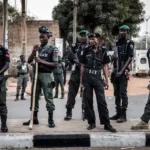Ahead of his inauguration on May 29, the Governor-elect of Niger state, Rt Honourable Mohammed Umar Bago, has initiated a community violence reduction strategy to curb youth restiveness in Minna, the capital of the state.
In recent years, Minna has been a hotbed of violence perpetrated by minors and youth who are known as yan-daba.
Bago’s strategy is aimed at restoring peace and order to the city and reforming the perpetrators.
The strategy is modeled after the United Nations’ Integrated Disarmament, Demobilsation and Reintegration (DDR) concept which directly contributes to the achievement of Sustainable Development Goal (SDG) 16.1.
- Court declares Obaseki’s suspension of unions illegal
- Group threatens to sue FCT minister for appointing junior staff as director
A sensitisation session featuring experts was however aired on the radio recently as one of the activities designed to prosecute the strategy.
The programme featured Barrister Maurice Magaji, Coordinator, Bago Economic Think-tank; Apostle Solomon K. Favour, Niger State Director, Politics and Governance for Pentecostal Fellowship of Nigeria; Galadima A. Bala Katcha, a Senior Lecture at IBB University, Lapai; Alhaji Umar M.K. Garba, Secretary, Minna Central Mosque; and Dantani Mohammed Salau, Chairman, Minna Metro Command of the Police Community Relations Committee (PCRC).
They each spoke on the causes of the problem, best ways of tackling it and the preventive approaches that should be adopted.
Salau attributed the violence youth are perpetrating in Minna to, first, “the weakness of our laws. Secondly, the compromise between those who matter in coordinating activities of youth from the parental level to the social welfare level; to the government itself not having a policy that will reduce the aggression in that age of youth.
“If you look at Minna, immediately after 2019 elections, kids that are of school age, maybe JSS 1 or 2; some of them because of the way they are being used politically, they see schooling as a burden. They don’t see it as a convention where they should go and learn things. They are exposed to money at a tender age and then relegating education.
“I am saying this because immediately after elections were concluded in 2019, COVID-19 came, and they were asked to remain indoors for 24 hours for almost a year. That necessitated their indoctrination and radicalisation into so many vices that today we are finding it hard to control. It is not only by arresting that it could be tamed; there must also be in place a social policy that has to do with young persons.”
According to Katcha, “First of all, I am aligning with the saying, ‘an idle mind is a devil’s workshop’. The restiveness is not only restricted to Minna. It is happening in almost every part of Niger state. There are a lot of youthful energies that are not being harnessed in the right way.
“Niger is a civil service state; there is no much creativity or innovation to harness the rampant youthful energies we have. That is why it is easy to recruit or initiate youth restiveness and commit crimes. Many of the youth are jobless and nothing is being done about it. Many of them are of the view that politics is about hooliganism, thuggery and others. These are part of the problem. We don’t channel the youthful energy the right way in the state. We must begin to make them innovative and inventive by putting the necessary tools in place.”
The scholar added that, “Many people have to be involved. Every government must have two ways of tackling youth restiveness. The first is by applying ideological state apparatus and the second one is by applying institutional state apparatus. The first one is that all the big people involved in molding the ideology of a child like the church, the mosque, the school, the teachers, etc. all these people have to orient the child under their wings.
“Government has to empower the National Orientation Agency to carry out orientations in the society. And then where all these fail, the institutional state apparatus must come in. This is where the institutions like the police, the military, etc. have to come in.”
On his part, Magaji attributed the problem to the erosion of family values and the implementation of government policies, saying, “It has a lot to do with family values. It has a lot to do with government policies and their implementation. Before 2019, thuggery existed but it was not as much as it is now. However, we forget the fact that we have had a lot of violence in our neighbouring states which has brought about the influx of people into our state.”
For Favour, “the youth have been exposed to money at a tender age. Some of our politicians exposed them to money and each time they don’t have money in their pockets, they look for ways to acquire money, and their way of making money is through the perpetration of violence.
According to Garba, “I believe the cause is lack of proper training by the parents. If we say it is because they don’t have jobs to do; that is not true completely. In Minna today, there are many workshops where you can go and learn a trade. Some of us were sent to the workshops to learn skills and we are doing well now. If the parents can properly train their kids right from childhood, things wouldn’t be the way they are.”

 Join Daily Trust WhatsApp Community For Quick Access To News and Happenings Around You.
Join Daily Trust WhatsApp Community For Quick Access To News and Happenings Around You.


